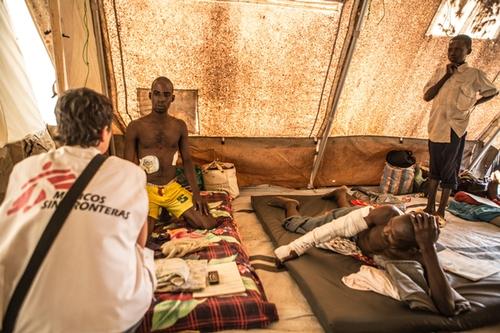Following several fatal episodes last week of inter-communal violence in Bangui, capital of Central African Republic (CAR), teams from Médecins Sans Frontières (MSF) treated more than 200 people at the community hospital and at the Castor Health Centre. Ninety patients required life-saving surgery.
Extreme violence
“We see a large number of cases every day,” said Marie-Elisabeth Ingres, MSF head of mission in CAR. “Our teams have witnessed the consequences of extreme violence, including bullet wounds, maimings from attacks, and lynchings, which are daily realities in Bangui.”
Thousands of people are fleeing the city out of fear of violence or are gathering in camps, where living conditions are extremely harsh. Humanitarian aid remains inadequate in the face of the significant needs.
100,000 still shelter at airport
MSF has increased its activities and set up a 60-bed clinic at the displaced persons’ site at Bangui’s M’Poko Airport, where more than 100,000 people are still gathered. MSF is also providing medical assistance in the capital at displaced persons’ sites at the Boy-Rabe and Don Bosco monasteries. Close to 30,000 people have taken shelter at each site. MSF teams are also working at several health centres across the city, and a medical team is in Zongo to assist refugees who crossed the Ubangi River to reach the Democratic Republic of the Congo (DRC).
MSF teams perform approximately 12,000 medical consultations and deliver nearly 300 babies every week in Bangui. Patients are treated for violence-related injuries and malaria, the country’s leading cause of death. People are also suffering from respiratory infections and diarrhoea, which are directly associated with the poor living conditions in the displacement camps.
MSF teams are attempting to improve living conditions by distributing basic supplies, building latrines, and distributing water to displaced persons in sites at the airport, Don Bosco, the Koranic school at PK5, and in St. Sauveur parish.
Situation worsening in country’s interior
Fighting and reprisal attacks continue between Séléka fighters and anti-Balaka militias. The U.N. Office for the Coordination of Humanitarian Affairs estimates there are more than 900,000 displaced persons—more than 20% of the population—across the country. Because of insecurity, they lack access to medical care and many people are hiding in the bush out of fear of violence.
Faced with this upsurge of violence, MSF has begun supporting the Berbérati Hospital in the country’s southwest region. Medical teams there are supporting its nutrition programme and paediatric unit.
New MSF projects outside capital
MSF is also launching new projects in the northwest of the country. A team arrived in Bouar to assist with medical and surgical emergencies at the hospital there. An MSF team is already delivering logistical and medical assistance to the Bozoum Hospital and has set up mobile clinics for the 2,500 people blocked inside the city by inter-communal violence. MSF emergency teams have also reached the cities of Bossemptélé, Baoro, and Bocaranga.
“Bocaranga is a ghost town,” said Delphine Chedorge, MSF emergency coordinator. “It’s empty, destroyed, and looted. It’s frightening there. Our contacts in the province are reporting extreme violence and population displacements. The population is terrorised. Unfortunately, the insecurity is slowing our ability to provide aid at the very moment when the situation calls for an emergency response that meets the population’s needs.”
MSF is also continuing emergency activities in Bossangoa, Bouguila, and Bouca, where it supports hospital departments and activities in camps located inside the cities, and organises mobile clinics to assist people who flee to the bush with every new cycle of violence.
MSF has been working in CAR since 1997. The organisation manages seven regular projects (in Batangafo, Carnot, Kabo, Ndélé, Paoua, Bria and Zémio) and eight emergency projects (in Bangui, Bozoum, Berbérati, Bouar, Boguila, Bossangoa and Bouca). In addition, a mobile emergency surgical team is traveling to Bossemptélé. MSF hopes to be able to launch activities at the hospitals in Bangassou and Ouango soon. Overall, MSF provides free medical care to nearly 400,000 people in 12 hospitals, 16 health centres and 40 health posts. The organisation’s teams include approximately 200 expatriate staff and more than 1,800 local employees.




